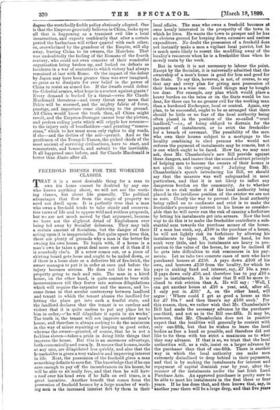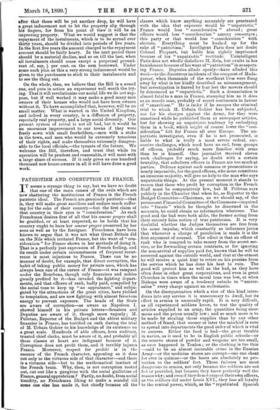FREEHOLD HOUSES FOR THE WORKING CLASSES. T HAT it is a
most desirable thing for a man to own his home cannot be doubted by any one who knows anything about, we will not say the work- ing classes, but about life generally. The political advantages that flow from the magic of property we need not dwell upon. It is perfectly true that a man who owns a freehold tends to take steady and conserva- tive views of life and to oppose wild and restless proposals, but we are not much moved by that argument, because we have not the slightest dread of Englishmen ever being led away by Socialist delusions. They may talk a certain amount of Socialism, but the danger of their acting upon it is inappreciable. But quite apart from this, there are plenty of grounds why a man is the better for owning his own house. To begin with, if a house is a man's own he takes a great deal more care of it than if it is somebody else's. If a screw comes out, or a piece of skirting board gets loose and ought to be nailed down, or if there is a loose slate or a defective bit of fire-brick, the owner manages to put it in order at once and before the injury becomes serious. He does not like to see his property going to rack and ruin. The man in a hired house, on the other hand, is quite content to bear with inconveniences till they fester into serious dilapidations which will require the carpenter and the mason, and be- come items in that secular controversy between landlord and tenant in which the tenant abuses the landlord for letting the place get into such a fearful state, and the landlord declares that the tenant is so careless and violent that it is quite useless to put any place let to him in order,—' he will dilapidate it again in six weeks.' The truth is, the tenant will not improve another man's house, and therefore is always seeking to do the minimum in the way of minor repairing or keeping in good order, whereas the owner—granted, of course, that he is not a feckless sloven—takes a pride in doing little things that improve the house. But this is an enormous advantage, both economically and morally. It means that houses, inside at any rate, are dilapidated less quickly, and also that the householder is given a very valuable and improving interest in life. Next, the possession of the freehold gives a man something definite to save for. The knowledge that if he can save enough to pay off the incumbrances on his house, he will be able to sit really free, and that then he will have a roof over his head even if ho falls on evil times, is a great incentive. Another benefit that comes from the possession of freehold houses by a large number of work- ing men is the increased interest felt by them in their local affairs. The man who owns a freehold becomes at once keenly interested in the prosperity of the town in which he lives. He wants the town to prosper and he has an obvious ground for keeping down excessive and useless expenditure. No doubt the possession of a freehold does not instantly make a man a vigilant local patriot, but he is much more likely to resent the muddling away of the locality's resources when he is a freeholder than when he merely rents by the week.
But in truth it is not necessary to labour the point. Except by the Socialist, it is universally admitted that the ownership of a man's home is good for him and good for the State. To say this, however, is not, of course, to say that any and every plan for giving men possession of their homes is a wise one. Good things may be bought too dear. For example, any plan which would place a heavy burden on the rates or on the State would be too dear, for there can be no greater evil for the working man than a burdened Exchequer, local or central. Again, any plan to be successful, ought to be so arranged that there should be little or no fear of the local authority being often placed in the position of the so-called "cruel landlord,"—i.e., of being obliged to distrain for the payment of instalments, or to evict the freeholder for a breach of covenant. The possibility of the men who own their houses subject to a mortgage to the locality combining to elect persons who would iaot enforce the payment of instalments may be remote, but it is one which ought to be faced. How far, we may next ask, does Mr. Chamberlain's new Bill provide against these dangers, and insure that the sound abstract principle of helping men to become the owners of their homes is not spoilt in the carrying out ? Judging from Mr. Chamberlain's speech introducing his Bill, we should say that the measure was well safeguarded in most particulars, and that it is not likely to inflict any dangerous burden on the community. As to whether there is no risk under it of the local authority being placed in the invidious position of the evictor we are not so sure. Clearly the way to prevent the local authority being called. on to confiscate and evict is to make the freeholder's pecuniary interest in his house so consider- able that he will never run the risk of causing a forfeiture by letting his instalments get into arrears. Now the best way to do this is to make the freeholder contribute a sub- stantial sum towards the purchase money of the house. If a man has sunk, say, £100 in the purchase of a house, he will not lightly risk its forfeiture by allowing his instalments to lapse. If, on the other hand, he has sunk very little, and his instalments are heavy in pro- portion to the value of the house, he may be inclined if he gets into difficulties to risk remissness in his pay- ments. Let us take two concrete cases of men who have purchased houses at .2250. A pays down £100 of his own, and borrows .2150 from the locality, for which he pays in sinking fund and interest, say, -V 10s. a year. B pays down only £50, and therefore has to pay £10 a year in instalments. It is clear that B will be more in- clined to risk eviction than A. He will say : Well, I can get another house at £10 a year, and, after all, I only put in £50.' A, on the other hand, will argue : Where could I get as good a house as this for .27 10s. ? and then there's my £100 sunk.' For this reason, then, we rather wish that Mr. Chamberlain's Bill had made the necessary advance by the purchaser one-third, and not as in the Bill one-fifth. It may be, however, that Mr. Chamberlain does not in practice expect that the localities will generally be content with only one-fifth, but that he wishes to leave the local bodies as free a hand as possible, and therefore did not like to tie them with too strict a maximum as to what they may advance. If that is so, we trust that the local authorities will, as a rule, insist on a larger advance by the purchaser than that of one-fifth. There is another way in which the local authority can make men extremely disinclined to drop behind in their payments, and that is by making the instalments for interest and repayment of capital diminish year by year, after the manner of the instalments under the last Irish Land Purchase Acts. An approved purchaser is pretty sure to be able to meet his instalments in the first three or four years. If he has done that, and then knows that, say, in another year there will be a large drop, and that five years after that there' will be yet another drop, he will have a great inducement not to let the property slip through his fingers, for from his point of view it will be an improving property. What we would suggest is that the repayment of the instalments, which is to be spread over thirty years, should be divided into periods of five years. In the first five years the amount charged to the repayment account should be fairly heavy. In the next period there should be a material decline, and so on till the last, when all instalments should cease except a perpetual ground- rent of, say, -} per cent. on the sum borrowed. Under some such plan as this a very strong inducement would be given to the purchasers to stick to their instalments and to see the thing out.
On the whole, then, we believe that the Bill is a sound one, and puts in action an experiment well worth the try- ing. That it will revolutionise our social life we do not sup- pose, but if well worked it may make a good many men owners of their houses who would not have been owners without it. To have accomplished that, however, will be no small matter. What is wanted in the United Kingdom, and indeed in every country, is a, diffusion of property, especially real property, and a large social diversity. Our present system of rental is not all bad, but it would be an enormous improvement to our towns if they were freely sown with small freeholders,—men with a stake in the town, and men who would be extremely tenacious of their rights, and make themselves extremely disagree- able to the local officials,—the tyrants of the future. We welcome the Bill, therefore, and trust that while its operation will be prudent and reasonable, it will meet with a, large share of success. If it only gives us one hundred thousand new house-owners in all it will have done a good work.







































 Previous page
Previous page